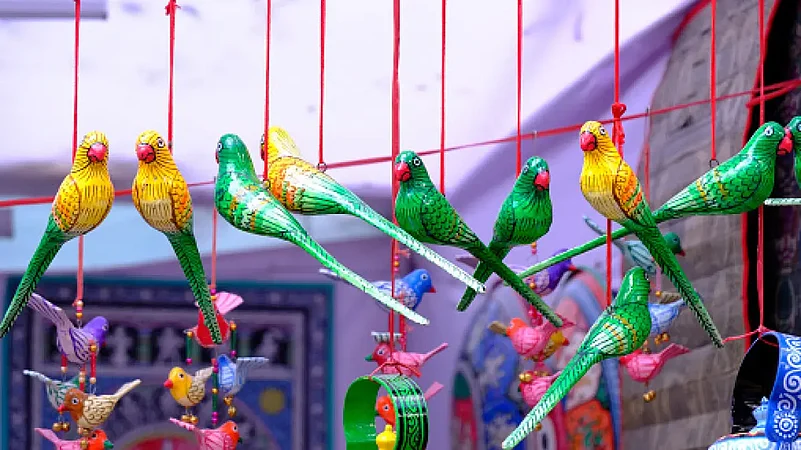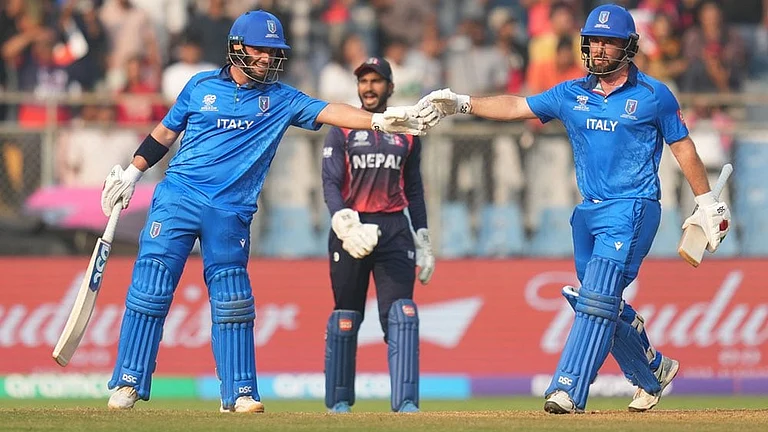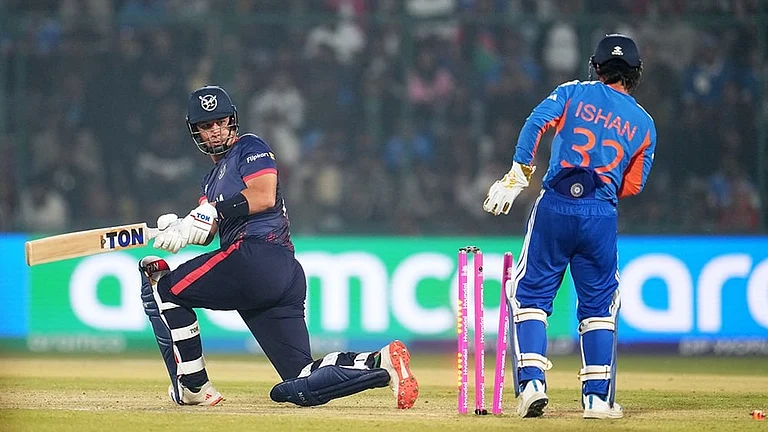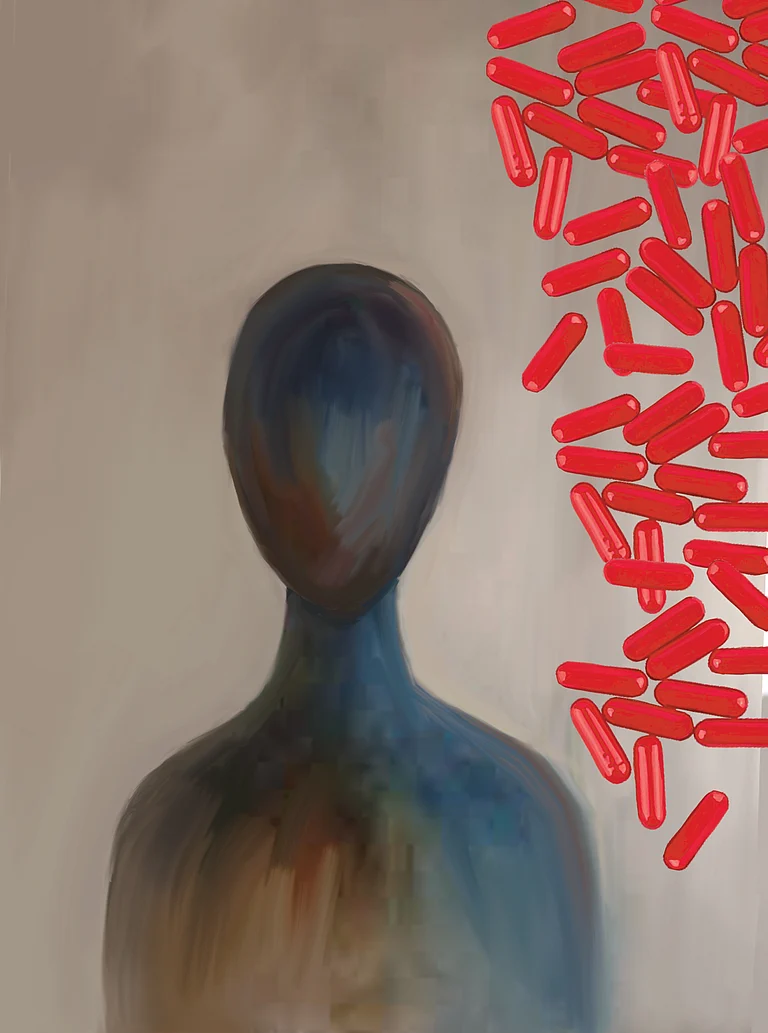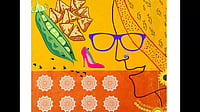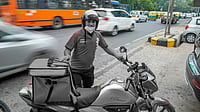I have always associated rain with Rath-er-mela.* The first summoner of monsoon was not petrichor but the soil’s slippery sink in the footprints of drenched pilgrims. I grew up in the part-modern, part-provincial Steel Township of Durgapur, West Bengal. In the nineties, the mela held at Chitralaya Mela Maidan was the most anticipated annual event.
Over the years, the mela has changed, people arrived and left the town, but the rain remains the same. The moist evenings; star-burst flood lights, blue translucence of tarpaulin tents, cymbaled prayers and the clamour of microphones. In a time when ‘all that is solid melts into the air,’ and every experience is either consumable or disposable, I like a maati-ir putul* return to an old-fashioned reminiscence of rain.
Durgapur was much like the noiseless town of Hawkins in the popular web series, Stranger Things. We did not have a defined Mind Flayer and Vecna but I often imagined my elder brother as one of them, especially, when he would succeed in buying his favourite toys. The Rath-er mela was an important target for both of us. Every day after coming back from school we would throw a tantrum. Once in two weeks our parents would agree. Frugality was a respectful scheme to discipline children, and we both were allotted a meagre budget. I do not remember feeling deprived. All I wanted was the experience and a humble set of khelna-baati* in aluminium.
The festive energy of the rain-washed mela ground was a needful break from the monotony of our sleepy neighbourhoods. A few hours of aimless and often absurd exploration of joy made us forget school-homework, Chitrahaar on Doordarshan and the regular ruti-tarkari* for dinner. The faithful rhythm of jhir-jhir brishti* settled on our wet shoulders and hemlines. Ma was always prepared to deliver her monologue on the impending shordi, kashi and jor. * Baba encouraged us to ignore the rain and made sure we bought our share of books from the boi-mela.*
Some days, if Baba was in a benevolent mood he would take us to the Circus. It used to be a rare occasion when the entire family would dress up. It was a delight to see Baba wearing clean clothes and talcum powder. He was a factory-man, proud of his worn-out industrial boots, safety helmets, stained cotton shirts, always smelling like coal, steel, and fire.
I remember the thundering sound of rain on the sprawling Circus tent, and the roar blending with the live music of trumpets and drums. The elephant playing football, the tiger grudgingly jumping through the ring of fire, the incredible swing of trapeze artists, the rage of anti-gravity dirt bikes in maut-ka-kuan,* and the joker’s nipped slapstick that children today might find silly. I was in awe of such antics; for me, the Circus, like the television, was a mainstream medium of entertainment. The present desertion of animals and the circus have left us with phantasmal flashes of a once palpable universe now replaced by ceaseless vortex of images.
The show ended late in the evening. After a series of hop, skip and jump over the slush, we would reach the food stalls. Illumined fantasy worlds—sugar syrup dripping from hot jilipis,* the crunch of gaja,* khaja,* the first famished bite into the warm egg roll, the spicy aloo chops,* creamy, tangy ghugni,* crispy Mughlai parathas* and constant sweat running down from our foreheads. This rare meditative exploration of tel-e-bhajas* within the confines of a sultry, greasy nightfall, interrupted by cool rain-fragrant breeze from the empty lots of the ground is still a storehouse of culinary therapy. Now, in a maze of home delivery Apps and global cuisines at our fingertips, I believe, simplicity is a skill.
I might sound like a child protagonist of a novel by Charles Dickens, but I truly admire Baba’s happy indulgence. Least did we know or cared that his career was at risk; those were the unrestful years of frequent labour strikes and Liberalisation. I will never forget the anxiety I once suffered when we could not find Baba in the mela. Ma was relaxed. She smartly spoke to the officials at the Information Center, held our hands and walked us back home. We paced through the wet asphalt streets glimmering under orange lights. I wondered if Baba never came home; did that mean that we would have to give up school and start working? What would my friends say? What if he was kidnapped by evil men in a Maruti van? I was relieved when I caught an echo through the rain-soaked air, ‘Mr Chattaraj, wherever you are, please come to the Information Desk.’ I felt guilty for not waiting for Baba. Ma assured that he would come back. I suppose more than twenty years of peaceful marriage instils a rare kind of confidence in women.
Rain evokes a river of memories in me. Often like Stephen Daedalus, I longed for a harmonised whisper, ‘a day of dappled sea-borne clouds.’* Instead, I woke up to a veiled sky spread over gigantic, smoke-billowing chimneys, a haze growing plumper and darker through the span of the day. Rain showered epiphanies; common but significant. In the course of time, I may have become Kafka’s Doll; * lost and found; a little changed, a little wiser, and wider with worldly experiences. Yet, I come back to rain for nourishment; taste the old water sheltering a birdling among fairy lights—a new hairband on her head, sugar candy in her mouth and mud on her musical slippers.
Notes:
*Rath-er-mela (Bangla): A carnival to celebrate Rath Yatra which is dedicated to Lord Jagannath, his elder brother Lord Balabhadra and his sister Goddess Subhadra. The Rath Yatra celebrates the annual journey of Lord Jagannath and his two siblings.
*maati-ir putul (Bangla): Clay doll.
*khelna-baati (Bangla): A set of miniature kitchen utensils.
* ruti-tarkari (Bangla): Wheat bread and vegetable curry.
*jhir-jhir brishti (Bangla): Drizzling rain.
* shordi, kashi and jor (Bangla): Cold, cough and fever.
* boi-mela (Bangla): Book Fair.
* maut-ka-kuan: a popular amusement show of car and bike stunts.
* jilipis (Bangla): A sweet snack. It is popularly known in Hindi as ‘Jalebi.’
*gaja, khaja (Bangla): Sweet snack.
*ghugni (Bangla): Spicy curry of yellow chickpeas.
* aloo chop: A cutlet or fritter made of spicy mashed potato.
*tel-e-bhaja (Bangla): Deep fried snacks usually consumed in the evening.
* A quote from the novel A Portrait of the Artist as a Young Man by James Joyce.
* Kafka’s Doll
(Jhilam Chattaraj is a Hyderabad based academic and poet.)






